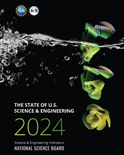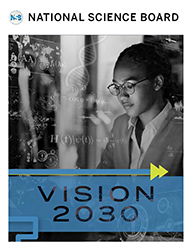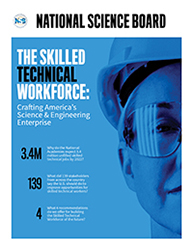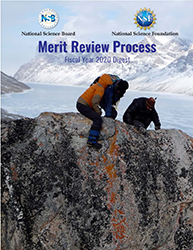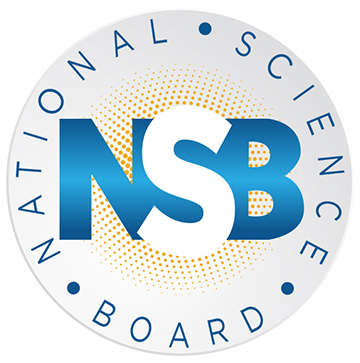
National Science Board elects new leaders
Research engineer and former astronaut Ellen Ochoa will be chair and chemist and change agent Victor McCrary will be vice chair
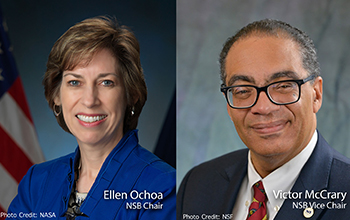
NSB Leadership (Credit and Larger Version)
May 7, 2020
Today the National Science Board (NSB) announced a new chair and vice chair to lead the NSB for the next two years. NSB is unique in that it serves as both the policymaking body of the National Science Foundation (NSF) and as an independent advisor to Congress and the President on science and engineering (S&E) and education in S&E policy matters.
NSB elected Ellen Ochoa, former director of the Lyndon B. Johnson Space Center as its chair and Victor McCrary, Vice President for Research and Graduate Programs at the University of the District of Columbia as its vice chair. Ochoa, current NSB vice chair, will replace Diane Souvaine, whose twelve years of service on the Board—the last two as chair—is ending. Ochoa and McCrary will officially assume their respective NSB roles on May 11, 2020.
“This is an Important time for science and I am honored to serve as chair of a board that is incredibly dedicated in its stewardship of NSF and our country’s S&E enterprise,” said Ellen Ochoa. “I look forward to working in partnership with NSF’s senior leadership, Congress, the Administration, the science and higher education communities, industry leaders, and many others to take the actions needed for the U.S. to remain preeminent in innovation and to ensure that all Americans have the opportunity to benefit from S&E.”
“I am humbled and delighted to be selected along with our incoming chair, Ellen Ochoa, to serve my Board colleagues, and the Foundation as we go forward to implement our vision of a diverse, dynamic and innovative research ecosystem for our nation," said Victor McCrary. “And to build that national research ecosystem, I welcome the opportunity to forge translational partnerships with industry, government, and academia to inspire and invest in our nation’s STEM talent base.”
About Ellen Ochoa
Ochoa, part of the NSB 2016 cohort, has been the vice chair the last two years and served on the Executive Committee and the Vision 2030 Task Force which led the NSB’s just-released Vision 2030 report.
Ochoa retired from thirty years of federal service in 2018 as Director of NASA's Johnson Space Center, which leads the U.S. human space flight enterprise. An experienced astronaut, Ochoa was a crew member on four space shuttle missions, leading onboard scientific activities, operating the robotic arm, and serving as flight engineer. As the first Hispanic female astronaut, Ochoa has given more than 300 presentations on the importance of science, technology, engineering, and math education. She has six schools named after her, several books written about her for the K-8 grades, and has been profiled in textbooks and on websites geared toward encouraging females and minorities to pursue technical fields.
After receiving her Ph.D. in Electrical Engineering from Stanford University, Ochoa began her career as a research engineer at Sandia National Laboratories and NASA Ames Research Center. She has three patents in the area of optical information processing and numerous publications in technical journals. She is a member of the National Academy of Engineering and a fellow of the American Institute of Aeronautics and Astronautics, the American Association for the Advancement of Science, the Optical Society of America and the National Academy of Inventors.
About Victor McCrary
McCrary is in his fourth year of service on the NSB. He has served on the External Engagement Committee and chaired the Honorary Awards Subcommittee and the Skilled Technical Workforce Task Force which led the NSB’s The Skilled Technical Workforce: Crafting America’s Science and Engineering Enterprise report issued in 2019.
McCrary is Vice President for Research and Graduate Programs at the University of the District of Columbia. Previously, he was Vice Chancellor for Research at the University of Tennessee, Knoxville and the first Vice President for Research and Economic Development at Morgan State University, Baltimore, MD. McCrary was the Business Area Executive for Science & Technology at The Johns Hopkins University Applied Physics Laboratory where he directed internal research and development (IRAD) funding to develop new core competencies and technologies in the areas of national security and space. He started his career at AT&T Bell Laboratories as a Member of Technical Staff and then as a program manager and division chief at the National Institute of Standards and Technology. McCrary has authored or co-authored over 60 technical papers and co-edited two books in his career. He is a former national president of the National Organization for the Professional Advancement of Black Chemists and Chemical Engineers (NOBCChE) and a Fellow of the American Chemical Society.
Honors include Most Promising Black Engineer in 1990 and co-recipient of the U.S. Department of Commerce’s Gold Medal in 2000. In 2005, McCrary was featured in Science Spectrum Magazine as one of the Top 50 Minorities in Science and elected to the 2007 DVD Association’s Hall of Fame. In 2011, he was honored as Scientist of the Year by the Annual Black Engineer of the Year Award (BEYA)-STEM Conference. The Catholic University of America honored him in 2015 with its Alumni Award for Research Excellence and Howard University recognized McCrary with its Distinguished Alumni Award in 2017.
About the National Science Board
The National Science Board and the NSF Director jointly pursue the goals and function of the NSF. NSB identifies issues critical to NSF's future and establishes the agency’s policies within the framework of applicable national policies set forth by the President and the Congress. The Board also serves as an independent body of advisors to both the President and the Congress on policy matters related to science and engineering and education in science and engineering. The President appoints NSB’s 24 members—selected for their eminence in research, education, and records of distinguished service—for staggered six-year terms.
Media Contact Nadine Lymn, National Science Board, (703) 292-2490, nlymn@nsf.gov
Useful NSB Web Sites:
Home Page: http://www.nsf.gov/nsb
Media Contact: http://www.nsf.gov/staff/staff_bio.jsp?lan=nlymn&org=NSF
News: http://www.nsf.gov/nsb/news
Meetings: http://www.nsf.gov/nsb/meetings
Publications: http://www.nsf.gov/nsb/publications
Facebook: https://www.facebook.com/NationalScienceBoard
Twitter: Twitter: https://twitter.com/intent/user?screen_name=NSF_NSB
YouTube: https://www.youtube.com/channel/UCkrHRzuGSrPp2haQs0T_Pww
To view PDF documents, please download Adobe Acrobat Reader.
